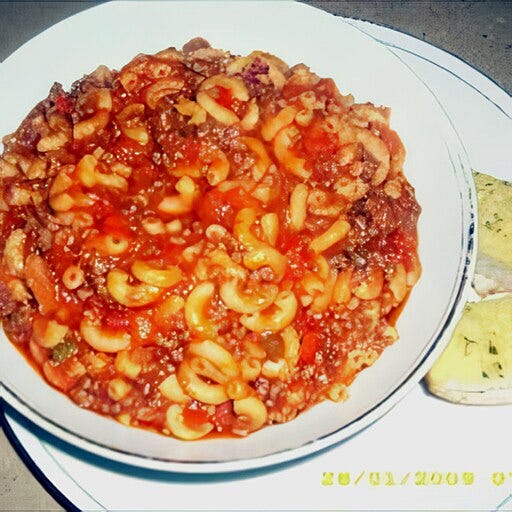One of my favorite comfort foods is American Goulash. My mom used to make it all the time when I was growing up. Looking back, I realize it was a super cheap meal. It has absolutely nothing to do with the original Hungarian dish. According to Wikipedia:
American goulash, sometimes called slumgullion, is an American comfort food dish, similar to American chop suey. American goulash is usually referred to in the midwestern and southern United States as simply "goulash".

With my Mom’s, it was elbow macaroni, ground beef, tomato sauce, onion, green pepper, Italian seasoning (the fancy already blended kind), and LOTS of garlic salt. Anyone else’s goulash might be different. You just took the things you thought were delicious and dumped them in the pot. My Mom’s, more Italian than Hungarian, but quintessentially American, was a one pot meal (along with Tuna Casserole) that made up many of our meals when we were struggling. And truthfully, even when we were flush.
So, how is this like my writing process?
For a long time, I was a total pantser. For the uninitiated, that means I wrote “by the seat of my pants”. There was no plan, no outline, just fingers on keys with maybe a vague notion of what the next five hundred words would bring. There were a lot of false starts, some short stories, and at least one completed novel written this way.
Somewhere along the way, I discovered the Snowflake Method. This is a way to create a very granular outline and character Bible created by a scientist. It’s very logical and straightforward. I wrote at least two novels and some partial novels with some of the steps in this method. Randy, the creator of the method, says that you by no means have to follow all of the steps.
I have also tried a version of the Save the Cat beat sheet. A beat sheet is essentially an outline using the most important beats of a traditional story arc. A beat is a “structural element in a narrative that marks a deliberate shift in tone or the advancement of the story”. It includes things like “All Is Lost”, where your protagonist has lost everything (as the name implies). Or the B Story which is a subplot like a love story or a side quest. It’s something that’s still important to the overall story, but it’s not the main thrust. You fill out your beat sheet and you have a good idea of your story’s overall arc.
Now we get to the goulash part. I’ve written a LOT of words. I don’t know how many, but let’s say it’s at least half a million. It’s probably a lot more than that, considering I’ve finished four novels, have at least half a dozen novels in various states of completion, and a veritable ocean of short stories. And none of that counts the non-fiction I’ve written. Over that time, I’ve internalized a lot of the things I’ve learned from the above-mentioned techniques.
When I set out to write a novel these days, I will create an outline using the Snowflake method and I’ll also identify the beats. When I write a short story or a novella, I’m still a pantser. But I’m a pantser who has a clear idea of where I want the story to go. I may have a clear idea of the ending, or I may even have a three to five sentence paragraph giving the story’s arc. Like goulash, I have taken the best of what I’ve tried and I’ve put them all into one pot. Then I put that pot on the stove and let it cook.
No one method is going to be right for everyone. If anyone gives you writing advice that starts with “you must”, run. Try a few of these methods. Pick the elements you find that work best for you. Find the time of day and the amount of time writing that works for you. You like to write in ten minute sprints a couple of times a day? Do that. You like to write for an hour? Do that. Write every day, or don’t. Outline, or don’t. Find the process which allows you to create the stories you want to tell. Make that goulash and don’t let anyone tell you it’s not delicious.





I have developed a similar method. For the moment I am not attempting another novel until I master the short story. I can’t work with the beat structure, it makes me lazy because once I know where I am going I will find the shortest route to get there. I need the space to get lost, not follow a template.
On another note, I went down your post list to comment on the one about being a Christian writer, but I saw “goulash” and as a central Eastern Europe I had to see what this is about. I am going to try it and have it with American Biscuits. Funny story: I first heard about biscuits when I was reading grapes of wrath and asked my (now) wife to cook them for me.